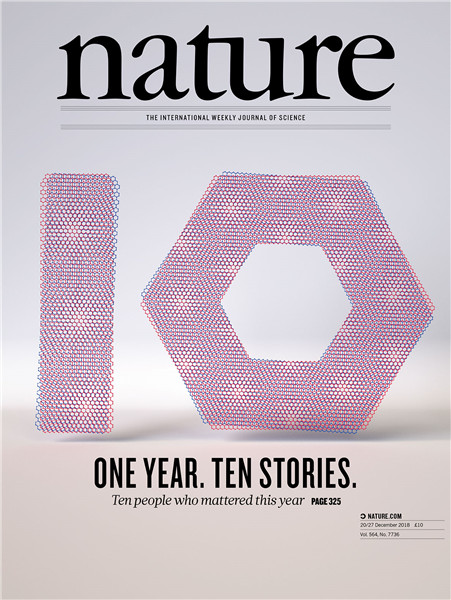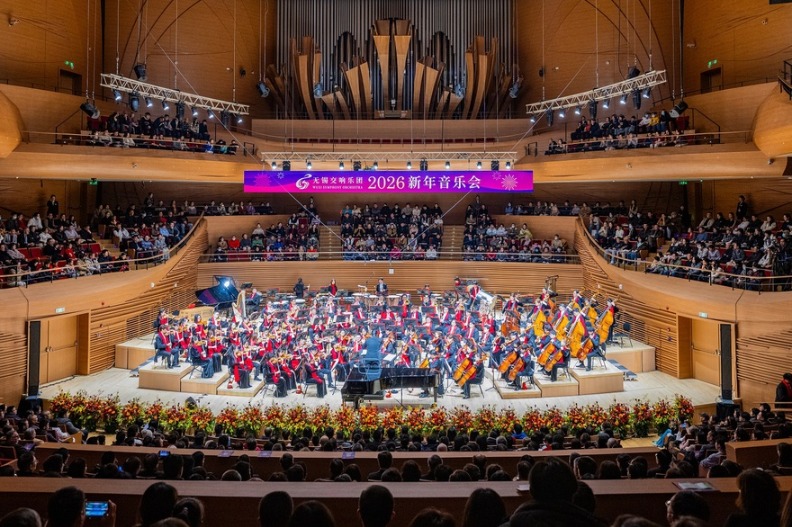Physics prodigy, 22, honored for discovery of 'magic angle'


Cao Yuan, a 22-year-old doctoral candidate in physics at the Massachusetts Institute of Technology, was named one of the 10 people who mattered this year by the journal Nature on Wednesday for discovering a "magic angle" in graphene sheets that spurred a new field of superconductor physics.
The physics prodigy from Chengdu, Sichuan province, is the third Chinese scientist in five years to make Nature's list for pushing scientific development. Pan Jianwei, a world-leading quantum scientist, and Chen Hualan, an expert on bird flu, made the list in 2017 and 2013, respectively.
Cao finished his middle and high school curricula in two years. By age 18, he had completed an undergraduate degree at the University of Science and Technology of China in Hefei, Anhui province. He then went to the United States to pursue a doctoral degree under MIT physics professor Pablo Jarillo-Herrero.
Young and shy, but a passionate "tinkerer" in electronics and chemistry, Cao's hobbies include photographing the night sky using homemade cameras, Jarillo-Herrero said. "Every time I go in (Cao's office), it's a huge mess, with computers taken apart and pieces of telescope all over his desk," he told Nature.
Cao has also shown maturity beyond his years, Jarillo-Herrero said, praising the young student for not being fazed by failures or misdirection in research. "He just rolled up his sleeves and continued working."
In March, Cao surprised the nanoscience community by discovering graphene can potentially be an insulator-a material that resists electricity-or a superconductor-a material that conducts electricity without resistance-by slightly changing the alignment of two graphene layers sandwiched together, according to two papers he published in Nature.
Graphene, first discovered in 2004, is a flat, honeycomblike grid made of a single layer of carbon atoms. It has emerged as one of the most promising nanomaterials for its useful properties, such as being the thinnest and strongest material in the world, and more electrically conductive than copper.
Cao's work showed that when the two layers of graphene were cooled to 1.7 degrees Celsius above absolute zero (-273 C) and rotated to a "magic angle" of 1.1 degrees, the overlaying graphene exhibited nonconducting behaviors.
But when a small electric field was applied in addition to the previous lab conditions, the electrons in the graphene sandwich can break out of the insulating state and flow without resistance.
"One can also imagine making a superconducting transistor out of graphene, which you can switch on and off, from superconducting to insulating. That opens many possibilities for quantum devices," Jarillo-Herrero told MIT News in March.
The prospect of manipulating complex electronic states through simple rotation thrilled engineers and physicists around the world. "There are so many things we can do," Cory Dean, a physicist at Columbia University, told Nature. "The opportunities at hand now are almost overwhelming."

In past experiments, graphene needed to be in contact with other superconductors to inherit some superconducting behaviors.
But Cao's discovery shows that superconductivity might be an intrinsic quality of the purely carbon-based material, taking a huge step in the decadeslong search for superconductors with a simpler makeup, and it might operate at room temperature.
Huang Jiatang, Cao's high-school physics teacher, told the Red Star News in Chengdu that he was "too excited to go to sleep" after hearing about his student making the discovery. Huang said he remembered Cao as a young kid with a superb ability to learn on his own, a love for hands-on experiments and being unafraid to challenge teachers and ask difficult questions.
However, Cao often stressed he was just an ordinary kid who simply loved reading about science and doing experiments, despite being enrolled at age 14 in USTC's School of the Gifted Young, a special program nurturing teenagers into world-class talents.
Cao told the Chengdu outlet that he didn't feel special because everyone in his program was extremely smart.
He said that neither did he feel superior to average college students, saying, "After all, we are all humans, with flaws and emotions."
The Nature article said Cao still doesn't know where he would like his career to go, but physicist Zeng Changgan, Cao's mentor at USTC, told Nature that many universities are already eyeing him for postdoctoral jobs and faculty posts. "The university would gladly have him back," he said.
Apart from those who pushed scientific development, Nature's list also included one or two figures that spurred global scientific debate.
He Jiankui, the Chinese biologist who performed a highly controversial experiment purporting to have created the world's first gene-edited babies, was also included for spurring debate over research standards and ethics.
- China reports 20% rise in inter-regional trips on first day of holiday
- China welcomes New Year in style
- Shanghai park holds ceremony for newly-arrived African penguin chick
- Yearender: Xi leads China through a pivotal 2025
- Tianjin University unveils initiative aimed at developing innovative leaders
- Nanjing Massacre survivors decreases to 23



































